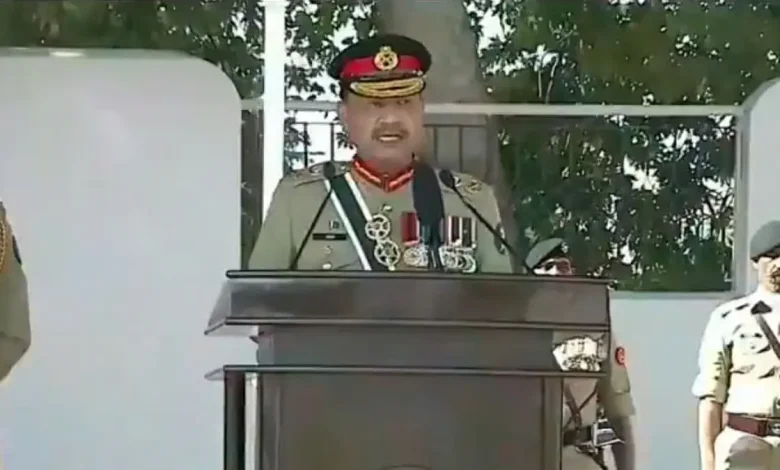Facing Taliban Tensions, Asim Munir Revives Anti-India Rhetoric to Deflect Domestic Criticism

As clashes between Pakistani forces and the Taliban intensify along the Afghanistan border, Pakistan Army Chief Field Marshal Asim Munir has reverted to his familiar anti-India narrative to rally domestic support. Addressing a passing-out parade at the Pakistan Military Academy (PMA) in Abbottabad, Munir claimed that “there is no space for war in a nuclearised environment,” while issuing thinly veiled warnings against India.
Without directly naming India, Munir warned that any “minor provocation” would be met with a “decisive” response, despite Pakistan’s recent military setbacks. His remarks come just months after India’s successful Operation Sindoor, during which Indian forces dismantled nine terror camps and struck 11 military bases within Pakistan-controlled territory.
🚨 Breaking 🇵🇰🪖
— Omkara (@OmkaraRoots) October 18, 2025
Failed Marshal Asim Munir Issues Nuclear and Economic Threats to India.
Should a fresh wave of hostilities be triggered, Pakistan would respond much beyond the expectations of the initiators.
Join | https://t.co/XeE1Rvnsap pic.twitter.com/eycQGNyMhm
“Should a fresh wave of hostilities be triggered, Pakistan’s response will exceed the expectations of the initiators,” Munir declared, adding that advances in Pakistan’s weapon systems could challenge “the misconceived immunity of India’s geographic war-space.”
A Strategic Diversion
Observers note that Munir’s renewed sabre-rattling against India serves as a distraction from the Pakistan Army’s deepening troubles at home. The country’s western border has seen heavy clashes with the Taliban, who continue to assert control along regions adjoining Khyber Pakhtunkhwa and Balochistan. Facing increasing criticism for his handling of border security, Munir appears to be using the India card to divert public frustration.
Ironically, his comments come just months after India demonstrated the vulnerability of Pakistan’s air defences. During the hostilities in May, Indian operations successfully jammed Chinese-made Pakistani air defence systems and destroyed several aircraft, including US F-16s and Chinese JF-17s, as later confirmed by IAF Chief Air Marshal A.P. Singh.
Warning to Taliban, Renewed Posturing on Kashmir
Munir also turned his attention to the Taliban regime, demanding immediate action against militant groups operating from Afghan soil, particularly the Tehrik-e-Taliban Pakistan (TTP). “A handful of terrorists cannot harm Pakistan,” he said, vowing to “reduce to dust” all groups using Afghanistan as a base for attacks.
These comments follow recent Pakistani airstrikes inside Afghanistan launched shortly after a brief 48-hour ceasefire signalling the rapid deterioration in Islamabad-Kabul relations. The Pakistani army chief urged Afghan leadership to “choose between peace and chaos,” though Kabul has denied claims that Afghan territory is being used for cross-border terrorism.
Reiterating Pakistan’s stance on Jammu and Kashmir, Munir called on India to resolve “core issues” under international law and pledged continued “moral and diplomatic support” to Kashmir residents. He claimed that Pakistan’s armed forces had shown “professionalism and capability” in their recent engagements comments analysts see as an attempt to bolster morale following Pakistan’s ceasefire request to India on May 10, which ended Operation Sindoor.
Internal Pressure Mounts
Munir’s rhetoric reflects growing unease within Pakistan’s military establishment. With public discontent rising over economic decline, border instability, and governance failures, the army chief’s aggressive speeches against India appear aimed at consolidating nationalist sentiment rather than addressing Pakistan’s deep-rooted security and political crises.




